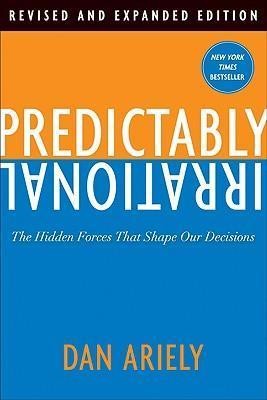Review of 'Predictably irrational : the hidden forces that shape our decisions' on 'Goodreads'
4 stars
Overall, this is a useful book. There's quite a bit of overlap conceptually with David Graeber's "Debt" and Daniel Kahneman's "Thinking Fast and Slow," but this one predates them by 3 years.
Social vs market norms. Similar to David Graeber's book about Debt. Social norms shouldn't be translated into market norms, or you destroy them. This book uses them to explain relationship costs in a useful way. Men paying for dinner on a date, if complaining that he always has to pay, converts it into a market norm. This therefore turns the possible sexual relationship from social to market, implying the date can be bought, which is a social insult. I think this is why so many people on the autism spectrum sound like incels: they view social norms in relationships as a financial exchange and therefore women as manipulators of value.
This construct of Ideas of "free/gift" crossing market …
Overall, this is a useful book. There's quite a bit of overlap conceptually with David Graeber's "Debt" and Daniel Kahneman's "Thinking Fast and Slow," but this one predates them by 3 years.
Social vs market norms. Similar to David Graeber's book about Debt. Social norms shouldn't be translated into market norms, or you destroy them. This book uses them to explain relationship costs in a useful way. Men paying for dinner on a date, if complaining that he always has to pay, converts it into a market norm. This therefore turns the possible sexual relationship from social to market, implying the date can be bought, which is a social insult. I think this is why so many people on the autism spectrum sound like incels: they view social norms in relationships as a financial exchange and therefore women as manipulators of value.
This construct of Ideas of "free/gift" crossing market and social norms in weird but predictable ways is a useful analytical tool. It's easy once you get going to classify every interaction in one of these 2 categories, and consider what would happen if it crossed into the other norm. Much more fruitful than Graeber's formulation.
People are willing to work for free, and they're willing to work for money, but if you offer them a small amount of money, they'll walk away.
Telling someone how much a gift costs puts it back into the market mode, and could be perceived as tasteless or offensive.
One of the other great ideas he has is bundling healthcare tests and common procedures like immunizations into regular, predictably priced service events, like with an auto dealership. However, if higher prices for drugs and healthcare are as positively correlated with satisfaction and pain relief as he says, then the US healthcare system must be the most satisfying one in the world. Since it is clearly not, this placebo effect is overstated.



